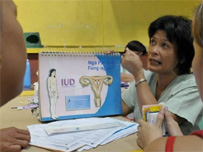
A health worker teaches women how to properly use a intra uterine device (IUD) in the Philippines in 2008. Intra-uterine devices designed to prevent conception may also protect against cervical cancer, according to a study covering more than 20,000 women that was released on Tuesday.
 |
Intra-uterine devices designed to prevent conception may also protect against cervical cancer, according to a study covering more than 20,000 women that was released on Tuesday.
Introduced in the 1970s, IUDs are today widely used around the world. The T-shaped device, containing either a plastic-and-copper wire or hormones, is placed inside the uterus to prevent pregnancy.
The study, published in the journal The Lancet Oncology, found that women with a history of using IUDs had roughly half the risk of developing cervical cancer compared to women who never used them.
Earlier research on IUD found a protection against cancer of the womb lining, but data on cancer of the cervix had been mixed.
Xavier Catellsague of L'Hospitalet de Llobregat in Catalonia, Spain and colleagues analysed data from 10 studies on cervical cancer and 16 studies on the prevalence of HPV infection.
Use of an IUD did not affect the risk of contracting human papillomavirus (HPV), but appeared to offer significant protection against both major types of cervical cancer.
For squamous-cell carcinoma, a cancer of the outer cervix, IUD use reduced likelihood by 44 percent. For adenocarcinomas, which develop from the mucous-producing gland cells of the inner cervix, the risk was cut by 54 percent, the study found.
The protective effect showed up in the first year and remained high even after a decade of use.
The findings, unexpectedly, also suggested that the risk of the human papillomavirus progressing to cervical cancer has been underestimated.
In a commentary, Karl Ulrich Petry of the Wolfsburg Clinic in Wolfsburg, Germany, described the results as "surprising" and likely to prompt a probe in failures in the widening programme to screen women for cervical cancer.
(Source: AFP)




